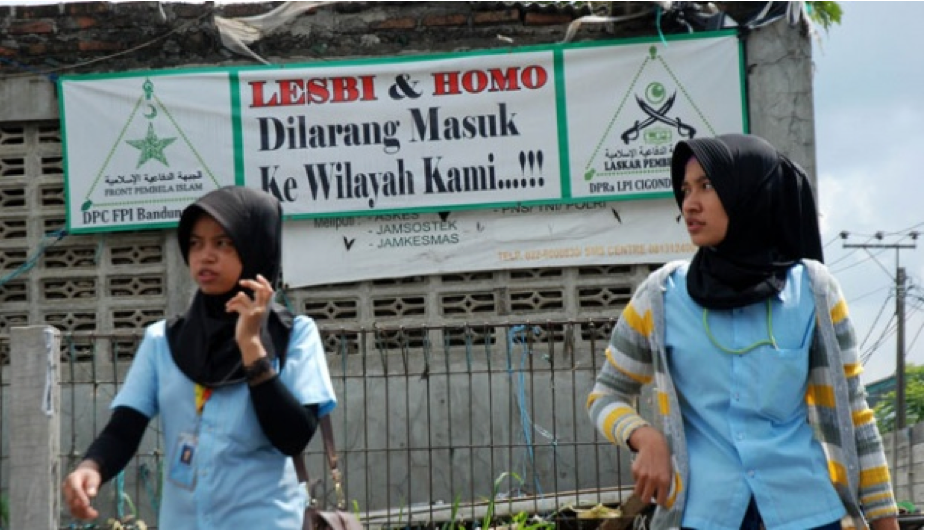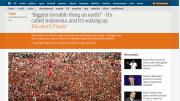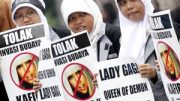Just hours after an incompetent attempt at terrorism shut central Jakarta down for about 20 minutes earlier this month, I wrote a commentary in the Financial Times saying that “Islamic State” (which, let’s remember, is neither) and similar rabid, back-to-the-7th-century fanatics had no traction in Indonesia because “Indonesia is a vibrant democracy and its citizens are proud of their diversity and tolerance”. (If the link to the FT doesn’t work for you, you can read the text in Word here).
The commentary refers to some work I’ve been doing with a colleague, Michael Buehler, analysing the spread of sharia-inspired local laws (peraturan daerah, or perda) across Indonesia. We find solid evidence that these perda are passed mostly for reasons of political self-interest. Either they bring in cash, or they create patronage opportunities, or politicians think that they are popular, and that they will help in re-election campaigns.
Interestingly, though, our analysis suggests that — SURPRISE — Indonesia’s political elite is out of touch with what most voters think and want. Local leaders who pass “morality” laws in their first term may make themselves popular with groups such as FPI, which then have a legal basis to go around smashing up those bars that don’t pay them protection money, but that does NOT translate into popularity with voters — they are much less likely to get re-elected compared with those who didn’t pass such laws in their first term. (Notes for nerds below.**) Interestingly, those who passed laws that effectively encourage Sunni (Wahabi?)-branded thugs to beat up on other sects did especially poorly in the provinces that have the strongest traditions of political Islam and the largest Moslem majorities.
And still, we get quite senior politicians thinking that appealing to intolerance is a populist move. The punch-bag of the week are gay men and women (and perhaps also transgenders, now inexorably grouped with the others under the daft acronym LGBT, though waria are socially, culturally and politically very differently positioned in Indonesian society compared with gays). First, the minister for research, technology, and higher education, Mohammad Nasir, said gays were not welcome on campus. Then the popular mayor of Bandung, Ridwan Kamil, got in on the act, in a very Indonesian way — support gay rights if you want, just don’t do it in public. (Here’s a useful summary of recent homophobic pronouncements by Indonesian officials from Human Rights Watch.) The Sunni-themed thugs in the FPI appear to have taken Ridwan’s comments as license to put up idiotic banners such as that pictured above and go house to house looking for same-sex-love. The FPI, Front Pembela Islam or Islamic Defenders’ Front, is one of several groups of Islamic-themed gangsters (pdf) who cloak their extortion rackets in the language of The Book. Guess what they found in the cheap boarding houses used by students in the university town of Bandung? Lots of young women sharing rooms!
FPI members are generally not very clever, and it may be that few of them have been to college far from home. But they are, after all, Indonesian. So they should know that in Indonesia, people of the same gender regularly bed down together — in some islands I’ve shared mattresses with three generations of women at once. And I can assure those shouty young men who wish to defend Indonesia’s morals that that does NOT make me a “lesbi”.
Stupidity on the part of gangsters is understandable. On the part of senior politicians it is less forgivable. There has been a bit of backtracking from several of the mouthiest politicians, including Nasir and Ridwan. But they, and all of their colleagues, appear to be very slow on the uptake. When will they learn that most Indonesian voters are way ahead of them in the desire to live and let live, otherwise known as tolerance?
**The data set was limited to the 254 local government heads who passed any sharia-inspired perda between 2001 and 2012 — 442 regulations altogether. These results compare the electoral fate of those who passed certain types of bylaws in their first term with those that did not. For those who care about these things, the results were statistically significant at the p<0.05 level.






Kereeen! I love your & Michael’s analysis on the shariah-based local irdinances, and your sarcasm. Salam dari Surabaya.
Thank you, Dr. Pisani, for the eloquently scientific response to bigotry. Recent news from Indonesia have profoundly saddened me.
you have a very poor understanding of Indonesia
here are all the conflicts related to Islam (yes Islam did play a large role in these conflicts, they were not political/ethinic) in modern times:
Aceh conflict
Papua conflict
Timor conflict
Maluku conflict
Central Sulawesi conflict (poso)
Sambas riots
Sampit conflict
Tarakan riot
and these are just the wide scale conflicts, forgetting all the dozens of terror attacks by various Islamic groups
only in the last week we see: http://www.aljazeera.com/news/2016/01/indonesia-takes-1600-sect-members-education-160128065052799.html
thousands of people forced to flee because of attacks upon their sect
try to be realistic about indonesia, it is not a ‘moderate’ country, it is a country where conservative Islam is wildly popular and a country with a long history of significant conflict motivated by Islam
With respect, I have to disagree with you. Not about my poor understanding of Indonesia — anyone who has spent close to 30 years trying to understand Indonesia knows very well that only the most arrogant observers would claim to have anything BUT a poor understanding of that fantastically complex nation. Rather, I disagree that Islam played a large role in most of the conflicts that you cite. I dedicated a whole chapter of Indonesia Etc to this topic, so won’t belabour it here. But conflicts over resources, mostly along ethnic fault-lines (which in some cases map onto religious differences) underlie all but one of the examples you give.
Your own biases lead you to perceive that these conflicts were about resources or ethnicity rather than Islam. And even if their triggers were something else, or they had other aggravating factors, the fact they ended up between Christians and Muslims, Muslims and animists etc should be illuminating for you. You must least admit that Islam played a significant role in all these conflicts.
Someone using common sense can see that the potential for Islamic violence on a mass scale is there in Indonesia and is on the verge of erupting. The Islamic state movement will become exceptionally large in Indonesia.
Ps: I appreciate the considered reply
I wanted to point out I forgot the biggest one, the mass killings of PKI communists. This was actually less a government anti-Communist purge than a massive outpouring of vigilantism in support of conservative Islam. The devout Muslims massed in their tens of thousands to support the eradication of the atheist Communists. The ‘santri’ (orthodox Muslims) massacred the pro-PKI ‘Abangan’ (heterodox ‘Muslims’ who mixed beliefs with Buddhism, Hinduism and animism). Both the major Islamic organisations, the Nahdlatul Ulama and Muhammadiyah fought the communists and declared jihad against them.
Indonesians history is completely the opposite of moderate and peaceful, rather it is full of Islamic violence.
“yes Islam did play a large role in these conflicts, they were not political/ethnic”
Dave, you should watch “Inside Indonesia’s War On Terror” to know more about what happened in this country especially in every terrorist attack and religious conflicts. You can see and analyze the pattern. Muslim just a scapegoat. Happy watching
There is some overlap between gangstets and poloticians….